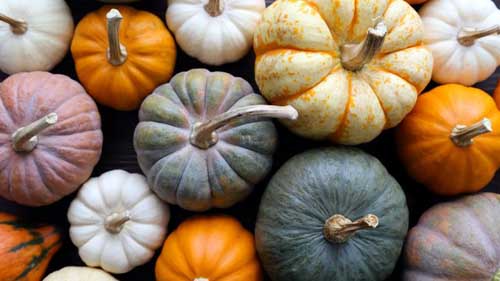Amazing health benefits of pumpkin
The health benefits of pumpkin

Rich in carotenoids, the pumpkin is good for the eyes and prostate and helps reduce the risk of cancer
The pumpkin, the pumpkin, the pumpkin, are cucurbits classified in the great family of squash. Squash contains various molecules beneficial to health: alkaloids, flavonoids, linoleic, oleic and palmitic acids. Pumpkin has anti-diabetic, anti-cancer and anti-inflammatory properties. Originally grown in America, squash spread to Europe, Asia. Its seeds and flesh are usually eaten. Pumpkin seeds are rich in protein. They also contain valuable amounts of essential fatty acids (linoleic acid) and vitamin E, known for its antioxidant properties. The fruit contains carotenes, vitamins and minerals. Here are some medical properties of squash supported by different research. However many studies have been done on animals or in vitro, clinical evidence in humans are lacking a little.
Its seeds are good for the prostate
But we must not expect miracles because the evidence remains slim. They have traditionally been used to relieve benign prostatic hypertrophy, and a double-blind, placebo-controlled clinical trial in 53 men has shown that a combination of pumpkin seed and saw palmetto extracts significantly improves the problems. urinary. In a second trial, American scientists tested the effectiveness of a pumpkin seed extract, saw palmetto and nettle seeds on the same problem but did not reach conclusive results. A third pharmacovigilance study conducted on 2245 people suggests that a pumpkin seed extract would reduce the symptoms of prostate hypertrophy by 41% without adverse effects. The substances contained in pumpkin seeds would act on urination but not on the volume of the prostate even if a study conducted on rats in 2006 showed a beneficial effect on this organ. The carotenoids of pumpkin fruits have also been associated with the prevention of prostate cancer. In addition, cucurmosin, a protein isolated from the fruit of the butternut squash Cucurbita moschata, has been shown to be toxic to certain cancer cell lines.
It reduces the risk of cancer
The pumpkin is almost as rich as carrot carotenoids, antioxidants that help fight against cancer, cardiovascular disease or sunburn. Several epidemiological studies have linked the consumption of carotenoid-rich vegetables to a reduction in the risk of cancer, particularly that of the prostate, breast and colon. Moreover, cryptoxanthin and alpha-carotene, two other carotenoids, are able, in vitro, to inhibit the proliferation of cancer cells. From this point of view, dietary carotenoids appear to be superior to those that can be taken as supplements. Diets rich in squash have been associated with a reduced risk of cancer of the stomach, breast, lung and colon-rectum.
It protects the eyes from aging
The pumpkin contains a lot of lutein and zeaxanthin, two carotenoid pigments for which the retina has a great affinity: it uses them as a filter against the blue light of the solar radiation, toxic for the retinal cells. In 2001, a team of Florida researchers showed that people with the highest levels of both pigments in their retinas had a risk of age-related macular degeneration (AMD) decreased by 82%. Several studies have also concluded that by consuming more lutein and zeaxanthin, either by a diet rich in products containing it or by supplementation, the retinal levels of the two pigments are increased. The relationship between lutein consumption and zeaxanthin and risk of AMD should be the subject of a clinical study to be confirmed. It does not increase blood sugar
Squash has a low glycemic index. A meta-analysis has shown that pumpkin extracts can help lower blood sugar levels in animals and humans. These results confirm those obtained in 2002 by a Japanese epidemiological study on pre-diabetic and diabetic people. The beneficial effects of pumpkin are attributed to carotenoids and some pumpkin polysaccharides. A recent study suggests that these substances could prevent the destruction of cells that synthesize insulin and even regenerate them. Squash of Siam would have a hypoglycemic effect in rabbits, but also in diabetic patients. Squash polysaccharides would play a hypoglycemic role: these polysaccharides would increase insulin levels and reduce blood glucose levels.
It promotes the immune and pulmonary system
US researchers have reviewed studies on this beta-carotene. Their conclusion: besides its antioxidant effects, food-derived beta-carotene promotes the functioning of certain cells of the immune system by improving the exchanges and the activity of certain immune cells. It may also have a beneficial effect on lung function but smokers, if they can consume pumpkin rich in beta-carotene, should avoid beta-carotene supplements that may increase their risk of cancer.
It has antimicrobial properties According to a 2010 review, pumpkin seed oil inhibits many bacteria: Acinetobacter baumanii, Enterococcus faecalis, Escherichia coli, Klebsiella pneumoniae, Pseudomonas aeruginosa, Salmonella typhi, Seratia marcescens or Staphylococcus aureus. In addition, three squash proteins, called MAP2, MAP4 and MAP11, slow the growth of yeast cells, MAP11 being the most effective. Another protein, called Pr-1, has antifungal properties.
Comments
Post a Comment